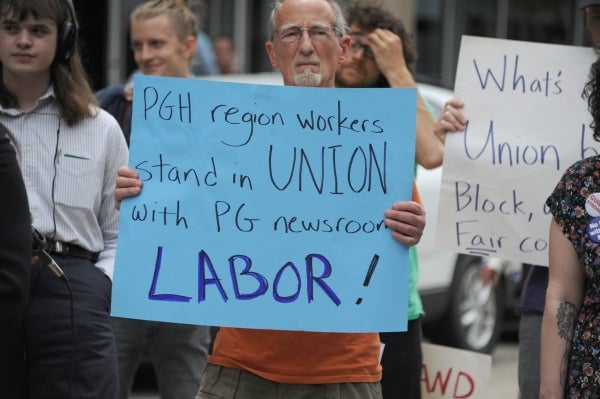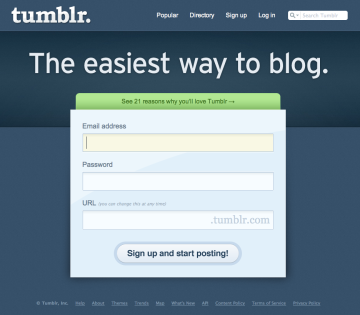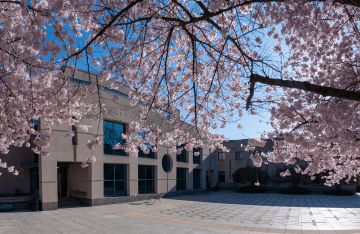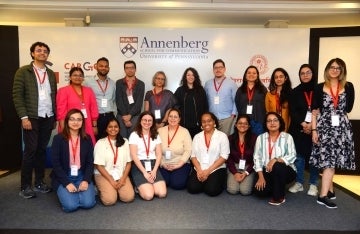What Is It Like To Be a Journalist During the “Fake News” Era? Not Easy.
Doctoral student Jeanna Sybert looks at how journalists in the U.S. are dealing with stress and job insecurity as newspapers shutter, wages are cut, and the legitimacy of their field is called into question

“Pittsburgh Post-Gazette Office” by Tony Webster (licensed under CC BY-ND 2.0.)
Jeanna Sybert grew up the child of two journalists. Her father spent his career as a news desk copy editor at the Pittsburgh-Post Gazette and her mother is currently a managing editor for a small paper outside of Pittsburgh.
As she thought about her career, Sybert resisted going into journalism as she witnessed the challenges her parents faced in the field. She decided she wanted to go into film.

But as an undergraduate at the University of Pittsburgh, she found her way back to journalism. She took a class in communication and rhetoric and soon was writing a senior thesis on U.S. news coverage of the Syrian civil war.
She still didn’t want to be a journalist, but she found she enjoyed studying journalism — how it affects culture, politics, and global conversation. She was curious about reporters’ individual choices: Why report on death? Why cover finance? Why include one detail and exclude another? Why choose to write for a magazine or a major newspaper or a local paper?
Now a doctoral candidate at the Annenberg School for Communication, Sybert studies labor conditions for journalists in the United States. Though many see journalism as a duty or a calling or simply a pursuit of the truth, it’s a job like any other, Sybert says.
Journalists deal with pay cuts, job losses, mistreatment from management, career instability. Even the smallest, family-run newspapers have occupational issues, Sybert documented in a paper in Journalism, despite the popular trope of “small local newspaper against the world.” A struggling small-town newspaper can be just as difficult to work for as a paper run by a corporation.
Coming to Annenberg pushed Sybert towards journalism studies, she says. Early in her time at Penn, she took C. Edwin Baker Professor of Media Policy and Political Economy Victor Pickard's “Understanding the Political Economy of Media” course, which gave her the language to express her interest in the role of capitalism in news, she says. Her advisor, Raymond Williams Professor of Communication Barbie Zelizer, is a former journalist herself.
Life at the Pittsburgh-Post Gazette
In June, 2021 Sybert published a study on employee welfare at the Pittsburgh-Post Gazette, documenting the contemporary issues facing journalists in the office. Because of her father’s connection to the Post Gazette and her own experience living in the city, Sybert thought that examining life at the paper would be a good entry into her graduate studies.
“My parents were always saying, ‘Don't be a journalist,’” Sybert says, “which I think is funny because my dissertation is about deteriorating working conditions for journalists, and how increasingly difficult it is to be a journalist in the U.S.”
Her interviews with reporters confirmed findings from other scholars: journalism in the U.S. is a progressively troubled field. Journalists are stressed, overworked, and demoralized. Public distrust of media, violence against reporters, and the shuttering of print newspapers are affecting journalists personally and as a group. This has consequences for how the news is presented to Americans and how they understand it.
What Sybert finds interesting about the Pittsburgh-Post Gazette in particular is its long history with labor rights. Journalists at the paper are members of the Newspaper Guild of Pittsburgh, a labor union started in 1934. Research on journalists as employees often focuses on freelancers, contractors, and unpaid interns — workers without union protections, Sybert says. Studying the Post Gazette provided an opportunity to investigate the careers of a relatively privileged class of journalists — salaried staff at a metro newspaper.
“My work on the paper has been part intellectual curiosity and part trying to make sense of something that was always in my life,” she says.
Strikes, boycotts, and layoffs

When Sybert conducted her study, the newspaper was going through some very public problems, including clashes with ownership, layoffs, a strike, and boycotts. Her interviews with reporters revealed a tumultuous environment filled with conflict and instability. Journalists at the paper faced a crumbling job market, attacks on the credibility of the press from a sitting President, increased workloads, and the unique challenge of, as Sybert puts it, “being expected to be the sense-makers of the crises they go through.”
Even with union power, the journalists at the Pittsburgh-Post Gazette weren't fully able to overcome their labor issues. Sybert wonders what this means for other papers with fewer resources: “Are we taking seriously how these conditions affect newswork and the ability to do newswork? Who are we asking to do more with less, with far less?”
Journalism in jeopardy
As a member of the steering committee of Annenberg’s Center for Media at Risk, Sybert has observed how difficult it is to be a journalist in the late 2010s and early 2020s. She’s concerned about the critical moment in journalism history that we are now experiencing.
Journalists have had to navigate life during a global pandemic while also sharing information about that pandemic to the public. They’ve faced heightened criticism since former President Trump waged a war on media, berating journalists and newspapers alike.
“The humanity of journalists is often overlooked in research,” Sybert says. “I'm really interested in thinking about journalists as workers — workers doing labor under exploitative conditions.”
Digital communities
In addition to her interest in journalism, Sybert’s other passion is digital communities. In 2021, she published a paper in New Media & Society about Tumblr’s adult content ban and its effect on Tumblr users.

“As someone who grew up on the internet I care about the internet and social media and digital culture specifically, which is why I looked at Tumblr,” she says.
While print media and Tumblr are different in many ways, Sybert sees similarities between the two. The adult content ban at Tumblr was a conflict of power between users and owners, while the conflict at the Post Gazette was one between employees and owners.
Reporters at the Post Gazette wanted better compensation and management; Tumblr users wanted a say in what went on in their community.
“This battle over the adult content ban is about who gets to govern, who gets power, what values and principles guide this online space,” Sybert says. “What I really think unites my interest in digital communities and journalism is thinking about systems of power at critical moments – when they're under strain or when there's a break in some way.”
Looking forward
Sybert is in the midst of preparing her dissertation proposal and is readying more studies on journalists and journalism at large. She wants to talk to journalists on every rung of the career ladder.
“Precarity is unevenly shouldered by different journalists,” she says. “It depends on your position — if you're a freelancer versus full time or salaried — your race, your gender, and so many more factors. I’m hoping to sample in a way that captures a diverse set of experiences and situations.”



